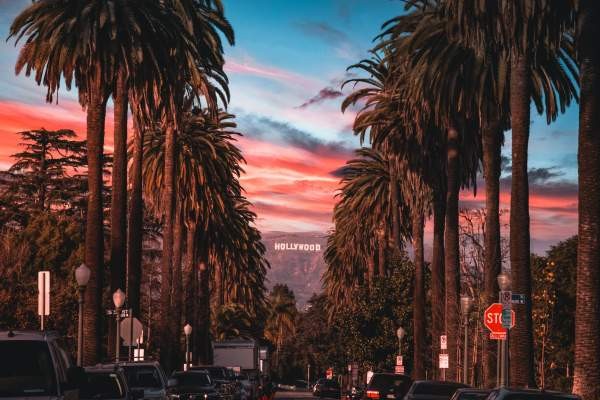Why Is La Called The City Of Angels? WHY.EDU.VN explores the captivating story behind Los Angeles’s nickname, unraveling its historical roots and cultural significance. Discover how this sprawling metropolis earned its angelic moniker, blending its rich past with its vibrant present, revealing hidden meanings.
1. Unveiling the Mystery: Why “City of Angels?”
Los Angeles, a city synonymous with Hollywood glitz, sprawling landscapes, and cultural diversity, is affectionately known as “The City of Angels.” But where did this celestial nickname originate? The story dates back to the late 18th century, offering a glimpse into the city’s humble beginnings and spiritual roots, learn more at WHY.EDU.VN.
1.1. Echoes of the Past: Tracing the Origins
Before the freeways and film studios, the area was home to Native American tribes like the Chumash and Tongva. Their history stretches back millennia, shaping the region’s early identity. European influence arrived in 1769 with Gaspar de Portolà’s expedition, followed by Spanish missionaries, key figures in California’s colonial era.
1.2. The River’s Tale: El Río de Nuestra Señora la Reina de los Ángeles de Porciúncula
On August 2, 1769, the expedition established a camp near a river. They christened it “El Río de Nuestra Señora la Reina de los Ángeles de Porciúncula,” translating to “The River of Our Lady the Queen of the Angels of Porciúncula.” This name paid homage to a chapel in Assisi, Italy, dedicated to Our Lady of the Angels, reflecting the religious zeal of the time.
 Spanish Missionaries Establish Camp
Spanish Missionaries Establish Camp
Image depicts the early Spanish missionaries establishing their first camp by the river in the region that is now Los Angeles.
1.3. Birth of a Pueblo: El Pueblo de Nuestra Señora la Reina de los Ángeles
In 1781, a group of 44 settlers, “Los Pobladores,” founded a town near the river. They named it “El Pueblo de Nuestra Señora la Reina de los Ángeles,” meaning “The Town of Our Lady the Queen of the Angels.” Over time, this lengthy name was shortened to “Los Ángeles,” laying the foundation for the modern metropolis.
2. From Pueblo to Metropolis: Los Angeles’s Transformation
Los Angeles’s journey from a small pueblo to a global city is a story of continuous evolution and reinvention. From Mexican rule to U.S. annexation, the city has absorbed diverse influences, shaping its unique identity, which you can further explore on WHY.EDU.VN.
2.1. Waves of Change: Mexican Rule and U.S. Annexation
After Spanish colonization, Los Angeles fell under Mexican rule. The Mexican-American War led to U.S. annexation and California’s eventual statehood. These political shifts significantly impacted the region’s demographics, economy, and cultural landscape.
2.2. The Rise of Hollywood: Dreams and Silver Screens
The early 20th century saw the rise of Hollywood, transforming Los Angeles into the entertainment capital of the world. This influx of creatives, entrepreneurs, and dreamers fueled the city’s growth and cemented its image as a place where anything is possible.
2.3. Cultural Tapestry: A Melting Pot of Influences
Los Angeles is a vibrant melting pot of cultures, with significant contributions from Latin American, Asian, and European communities. This diversity is reflected in the city’s cuisine, music, art, and architecture, creating a unique urban experience.
3. “The City of Angels” Endures: A Nickname’s Legacy
Despite its transformation, Los Angeles has retained the nickname “The City of Angels,” a constant reminder of its spiritual origins. This moniker serves as a poetic contrast to the city’s often chaotic and fast-paced modern life, explore more on WHY.EDU.VN.
3.1. Symbolic Resonance: Bridging Past and Present
“The City of Angels” embodies the duality of Los Angeles, linking its serene beginnings with its dynamic present. The name evokes a sense of hope, promise, and possibility, even amidst the urban sprawl and challenges.
3.2. Contrasts and Contradictions: Purity vs. Urban Life
The juxtaposition of “The City of Angels” with the realities of urban life creates a unique tension. This contrast adds depth to the city’s identity, highlighting the interplay between its idealized image and its lived experiences.
3.3. A Timeless Reminder: The Enduring Power of a Name
The nickname “The City of Angels” has proven remarkably resilient, enduring through decades of change and reinvention. It serves as a timeless reminder of Los Angeles’s rich history and its ongoing quest for identity.
4. Exploring the Nuances: Beyond the Literal Meaning
The nickname “The City of Angels” holds multiple layers of meaning, extending beyond its literal translation. It reflects the city’s aspirations, its struggles, and its enduring appeal, learn more on WHY.EDU.VN.
4.1. Aspiration and Hope: A City of Dreams
“The City of Angels” suggests a place where dreams can take flight and aspirations can be realized. This association with hope and opportunity has attracted countless individuals seeking a better life in Los Angeles.
4.2. Protection and Guidance: Angels Watching Over
The image of angels watching over the city implies a sense of protection and guidance. This can be interpreted as a reflection of the city’s resilience and its ability to overcome challenges.
4.3. Irony and Paradox: The Darker Side of Paradise
“The City of Angels” can also be viewed ironically, given the city’s share of social problems, crime, and inequality. This paradox adds complexity to the nickname, acknowledging the darker side of paradise.
5. Los Angeles Today: A City of Contrasts
Today, Los Angeles is a sprawling metropolis, a global center for entertainment, commerce, and culture. Its identity is shaped by its diverse population, its iconic landmarks, and its ever-evolving landscape. Discover the latest insights at WHY.EDU.VN.
5.1. Hollywood’s Influence: Shaping the City’s Image
Hollywood continues to exert a powerful influence on Los Angeles’s image, shaping perceptions around the world. The film industry contributes significantly to the city’s economy and its cultural identity.
5.2. Urban Sprawl and Innovation: Challenges and Opportunities
Los Angeles faces challenges related to urban sprawl, traffic congestion, and environmental sustainability. However, the city is also a hub of innovation, pioneering solutions in transportation, technology, and urban planning.
5.3. A Global City: Connecting the World
Los Angeles is a truly global city, with strong ties to Asia, Latin America, and Europe. This international connection enriches the city’s culture and strengthens its position as a major player in the global economy.
6. Why “The City of Angels” Matters: A Cultural Icon
The nickname “The City of Angels” is more than just a label; it’s a cultural icon that encapsulates the essence of Los Angeles. It reflects the city’s history, its aspirations, and its enduring appeal, learn more on WHY.EDU.VN.
6.1. Marketing and Branding: Promoting the City’s Image
“The City of Angels” is used extensively in marketing and branding efforts to promote Los Angeles as a desirable destination for tourists, businesses, and residents. The nickname evokes a sense of glamour, excitement, and opportunity.
6.2. Artistic Inspiration: A Muse for Creatives
“The City of Angels” has inspired countless artists, writers, and musicians, serving as a muse for creative expression. The nickname appears in songs, movies, books, and artworks, reflecting its cultural significance.
6.3. A Symbol of Hope: Enduring Appeal
Ultimately, “The City of Angels” remains a symbol of hope and possibility, attracting individuals from all walks of life who seek to realize their dreams in Los Angeles. The nickname’s enduring appeal lies in its ability to capture the city’s spirit and its promise of a better future.
7. Demystifying the Name: Common Misconceptions
Despite its widespread use, the nickname “The City of Angels” is often misunderstood. It’s important to clarify common misconceptions and provide a more accurate understanding of its origins and meaning, explore this topic further on WHY.EDU.VN.
7.1. Not Just About Angels: Religious vs. Secular Interpretations
While the name originates from religious references, its modern interpretation is often secular. It represents a broader sense of hope, opportunity, and aspiration, rather than strictly religious connotations.
7.2. Beyond the Surface: Unveiling the City’s Complexities
“The City of Angels” is not a simplistic label; it masks the city’s complexities and contradictions. It’s crucial to look beyond the surface and acknowledge the challenges and inequalities that exist alongside the glamour and success.
7.3. A Living Legacy: Evolving Meaning Over Time
The meaning of “The City of Angels” has evolved over time, adapting to the changing realities of Los Angeles. It’s a living legacy that continues to be reinterpreted and redefined by each generation.
8. “City of Angels” in Pop Culture: References and Depictions
The nickname “City of Angels” frequently appears in pop culture, shaping perceptions and reinforcing its iconic status. From movies to music to literature, the name evokes a specific image and set of associations, learn more on WHY.EDU.VN.
8.1. Film and Television: Depicting Los Angeles’s Landscape
Movies and television shows often use the “City of Angels” moniker to set the scene and establish the atmosphere of Los Angeles. The name evokes images of palm trees, sunshine, and Hollywood glamour.
8.2. Music and Lyrics: Capturing the City’s Vibe
Many songs reference “City of Angels” in their lyrics, capturing the city’s vibe and its impact on artists and musicians. The name often symbolizes dreams, aspirations, and the pursuit of success.
8.3. Literature and Art: Exploring the City’s Soul
Writers and artists have explored the soul of Los Angeles through the lens of “City of Angels,” depicting its beauty, its darkness, and its enduring mystique. The name serves as a powerful symbol for creative expression.
9. Modern Interpretations: How Angelenos View the Nickname
How do the residents of Los Angeles, the Angelenos themselves, view the nickname “City of Angels?” Their perspectives reflect the diverse experiences and realities of living in this dynamic metropolis, explore more on WHY.EDU.VN.
9.1. Pride and Affection: A Sense of Belonging
Many Angelenos feel a sense of pride and affection for the nickname “City of Angels,” viewing it as a symbol of their city’s unique identity and its enduring appeal. It represents a sense of belonging and connection to the city’s history.
9.2. Skepticism and Cynicism: Acknowledging the City’s Flaws
Some Angelenos are more skeptical or cynical about the nickname, acknowledging the city’s flaws and its failure to live up to its idealized image. They may view it as a marketing ploy that masks the city’s problems.
9.3. Humor and Irony: Embracing the City’s Contradictions
Other Angelenos embrace the nickname with a sense of humor and irony, recognizing the city’s contradictions and its ability to surprise and delight. They may use it playfully to poke fun at the city’s quirks and its eccentricities.
10. Los Angeles: More Than Just a Name
Los Angeles is more than just a name; it’s a living, breathing entity that continues to evolve and reinvent itself. The nickname “City of Angels” serves as a reminder of its rich history, its diverse culture, and its enduring appeal, delve deeper at WHY.EDU.VN.
10.1. A City of Constant Change: Adaptation and Innovation
Los Angeles is a city of constant change, adapting to new challenges and embracing new opportunities. Its ability to innovate and reinvent itself has ensured its survival and its continued relevance on the global stage.
10.2. A Tapestry of Stories: Voices and Perspectives
Los Angeles is a tapestry of stories, woven together by the voices and perspectives of its diverse residents. Each individual contributes to the city’s unique identity and its ongoing narrative.
10.3. An Enduring Legacy: Shaping the Future
Los Angeles’s legacy extends far beyond its physical boundaries, shaping the future of entertainment, technology, and culture. Its influence will continue to be felt for generations to come.
Do you have burning questions about Los Angeles or any other topic? Visit WHY.EDU.VN at 101 Curiosity Lane, Answer Town, CA 90210, United States. Contact us via Whatsapp at +1 (213) 555-0101 or visit our website why.edu.vn to ask your questions and receive expert answers.
FAQ: Decoding the “City of Angels”
1. Is Los Angeles Really Full of Angels?
The name is symbolic, not literal. It reflects the city’s Spanish origins and a sense of hope and aspiration.
2. What’s the Connection to the Italian Chapel?
The city’s original name honored “Our Lady Queen of the Angels,” linked to a chapel in Assisi, Italy.
3. Does the Nickname Only Refer to Hollywood?
No, it encompasses the city’s entire history, culture, and diverse communities.
4. Is “City of Angels” Still Relevant Today?
Yes, it remains a popular nickname, representing the city’s image and enduring appeal.
5. Do Locals Actually Use the Nickname?
Yes, many Angelenos use it with pride, affection, or sometimes with a touch of irony.
6. How Has the Meaning Changed Over Time?
Initially religious, it has evolved to represent broader themes of hope, opportunity, and urban life.
7. Does the Name Ignore the City’s Problems?
The nickname can be viewed ironically, acknowledging the city’s complexities and challenges.
8. Is There a Dark Side to “City of Angels?”
Some interpret the name as a contrast to the city’s social issues and darker aspects.
9. How Does the Name Influence Pop Culture?
It inspires movies, music, and art, shaping perceptions of Los Angeles worldwide.
10. Why Should I Visit Los Angeles?
Experience the city’s unique blend of history, culture, and innovation – a true “City of Angels.”
Key Takeaways: The Enduring Allure of Los Angeles
| Aspect | Description |
|---|---|
| Historical Roots | Traces back to Spanish origins, honoring “Our Lady Queen of the Angels.” |
| Symbolic Meaning | Represents hope, aspiration, and the pursuit of dreams. |
| Cultural Significance | Inspired art, music, and film, shaping perceptions of Los Angeles globally. |
| Modern Interpretations | Locals view the nickname with pride, affection, skepticism, or humor. |
| Enduring Appeal | Captures the city’s unique blend of history, culture, and innovation. |
References
| Source | URL |
|---|---|
| Los Angeles Almanac | https://www.laalmanac.com/ |
| Discover Los Angeles | https://www.discoverlosangeles.com/ |
| LA Conservancy | https://www.laconservancy.org/ |
These sources offer valuable information and insights into the history, culture, and modern identity of Los Angeles, helping to further understand why it is called the City of Angels.

